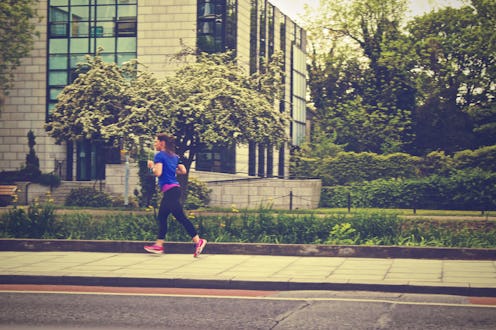Life
5 Mental Benefits You Can Get By Running

Whether it’s pounding the pavement on a run, dripping sweat in a spin class, logging miles in a pool, or lifting weights at the gym, most people exercise to get stronger. But exercise, specifically running, doesn’t just boost your physical abilities; it also gives you a stronger mental game. How so? Well, exercise increases the production of endorphins, which are the feel-good chemicals released in our bodies to counter stress. Running helps your brain by filling your blood with oxygen, which then assists functions like creativity and memory.
“Even if you don’t experience a runner’s high or run a marathon, you are still doing your brain a big favor by jogging in your neighborhood on a consistent basis,” says Dr. Jeff Brown, a psychologist at Harvard University and author of The Runner’s Brain: How to Think Smarter to Run Better , through email.
Try not to get wrapped up in your age or the time it takes you to run a mile. What matters most is that you’re outside becoming one with the pavement (or treadmill). Studies show exercise is one of the most critical factors of caring for your brain. Need more convincing? Here are five mental benefits you can get from running.
1. Running Reduces Stress
Whether you’re overwhelmed with deadlines at work or maintaining a busy social life, running can help you escape stress. The movements stimulate your body in a positive way by creating endorphins and acting as a temporary distraction from the demands you must answer to throughout the day.
Running also allows you to focus on what’s actually important over everyday anxieties. “When you can stop obsessing about stuff and just allow yourself to destress and [look at the] bigger picture, you often find simple answers to the things you’re stressing out about,” says Jeff Simons, a professor of psychology of motor learning at California State University, East Bay.
2. Running Improves Self-Confidence
Running is a choice. You can enhance your self-confidence by committing to a run, taking action, and living that experience. Through that process, you can recognize that you have control over what you do and discover what you’re capable of accomplishing. Whether it’s challenging yourself to run an extra mile around the block or registering for a road race, it’s affirming to set a goal, then work toward and achieve it.
“When you feel like you have the ability to make choices in your life, then you feel empowered,” Simons says. “It’s not about how fast you go; it’s about having the experience. And if you can settle into your own rhythm, find your own distance and own time, and slowly work with that, you’re actually having a very similar experience to an elite athlete.”
3. Running Is Moving Meditation
Whether you’re a marathoner or a newbie runner, the rhythm of running is essentially a moving meditation, Simons says. This form of meditation is an active state as you run because you are immersed in your activity. It’s brought on by the rhythm of your breathing and the movement of your body, and can decrease anxiety and depression.
“I see running as moving meditation, where your mantra is your steps [and] your strides, so it’s a way to stay in the presence,” says Dr. Jim Taylor, a sub 3-hour marathoner and sports psychologist based in San Francisco. “It’s also a great way to work through issues, conflicts, problems in a more open place.”
4. Running Gets the Creative Juices Flowing
While doing an aerobic activity like running, walking, or dancing, you often get into a creative space because your mind opens. Running can be a big part of the creative process because your mind emerges in different environments, say while on a trail or a quiet street in your neighborhood.
Dr. Taylor says he does some of his best writing and problem-solving when he’s running because the activity “puts me in a nonlinear state where ideas just come out of my unconscious.”
It might be frustrating when you return from your run and can’t remember all of the brilliant ideas that popped into your mind. Simons encourages runners to quickly and briefly type a thought on your phone or voice record it so you can jog your memory later.
5. Running Offers An Adventure...Even For Your Brain
Maybe it’s 30 minutes, 45 minutes, or an hour. However long you’re outside or on a treadmill, running is your own space and adventure. It’s time out of your day when you’re running ... just to run.
“There is something really magical, and I think that’s a bit of brain relaxation that’s a really good mental health benefit,” Simons says. “It’s a time-out during the day and it’s kind of just for you, which I think is really powerful.”
Images: unsplash.com (4); Tim Gouw (1); picography.co (1)